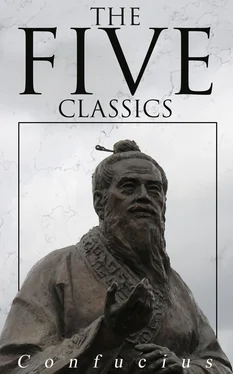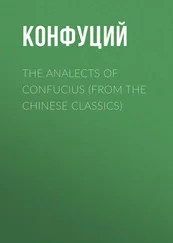I do not express myself thus in any spirit of hostility. If, by discoveries in Accadian or any other long-buried and forgotten language, M. Terrien de Lacouperie can throw new light on the written characters of China or on its speech, no one will rejoice more than myself; but his ignorance of how the contents of the classic are made up does not give much prospect of success in his promised translation.
In the preface to the third volume of these 'Sacred Books of the East,' containing the Shû King, Shih King, and Hsiâo King, I have spoken of the Chinese terms Tî and Shang Tî, and shown how I felt it necessary to continue to render them by our word God, as I had done in all my translations of the Chinese classics since 1861. My doing so gave offence to some of the missionaries in China and others; and in June, 1880, twenty-three gentlemen addressed a letter to Professor F. Max Müller, complaining that, in such a work edited by him, he should allow me to give my own private interpretation of the name or names in question instead of translating them or transferring them. Professor Müller published the letter which he had received, with his reply to it, in the 'Times' newspaper of Dec. 30, 1880. Since then the matter has rested, and I introduce it again here in this preface, because, though we do not meet with the name in the Yî so frequently as in the Shû and Shih, I have, as before, wherever it does occur, translated it by God. Those who object to that term say that Shang Tî might be rendered by 'Supreme Ruler' or 'Supreme Emperor,' or by 'Ruler (or Emperor) on high;' but when I examined the question, more than thirty years ago, with all possible interest and all the resources at my command, I came to the conclusions that Tî, on its first employment by the Chinese fathers, was intended to express the same concept which our fathers expressed by God, and that such has been its highest and proper application ever since. There would be little if any difference in the meaning conveyed to readers by 'Supreme Ruler' and 'God;' but when I render Tî by God and Shang Tî by the Supreme God, or, for the sake of brevity, simply by God, I am translating, and not giving a private interpretation of my own. I do it not in the interests of controversy, but as the simple expression of what to me is truth; and I am glad to know that a great majority of the Protestant missionaries in China use Tî and Shang Tî as the nearest analogue for God.
It would be tedious to mention the many critical editions and commentaries that I have used in preparing the translation. I have not had the help of able native scholars, which saved time and was otherwise valuable when I was working in the East on other classics. The want of this, however, has been more than compensated in some respects by my copy of the 'Daily Lectures on the Yî,' the full title of which is given on page xiv. The friend who purchased it for me five years ago in Canton was obliged to content himself with a second-hand copy; but I found that the previous owner had been a ripe scholar who freely used his pencil in pursuing his studies. It was possible, from his punctuation, interlineations, and many marginal notes, to follow the exercises of his mind, patiently pursuing his search for the meaning of the most difficult passages. I am under great obligations to him; and also to the K âu Yî K eh K ung, the great imperial edition of the present dynasty, first published in 1715. I have generally spoken of its authors as the Khang-hsî editors. Their numerous discussions of the meaning, and ingenious decisions, go far to raise the interpretation of the Yî to a science.
J. L.
OXFORD
16th March, 1882
Table of Contents
CHAPTER I
THE YÎ KING FROM THE TWELFTH CENTURY B.C. TO THE COMMENCEMENT OF THE CHRISTIAN ERA
Table of Contents
1. Confucius is reported to have said on one occasion, 'If some years were added to my life, I would give fifty to the study of the Yî, and might then escape falling into great errors 1.' The utterance is referred by the best critics to the closing period of Confucius' life, when he had returned from his long and painful wanderings among the States, and was settled again. in his native Lû. By this time he was nearly seventy, and it seems strange, if he spoke seriously, that he should have thought it possible for his life to be prolonged other fifty years. So far as that specification is concerned, a corruption of the text is generally admitted. My reason for adducing the passage has simply been to prove from it the existence of a Yî King in the time of Confucius. In the history of him by Sze-mâ Kh ien it is stated that, in the closing years of his life, he became fond of the Yî, and wrote various appendixes to it, that he read his copy of it so much that the leathern thongs (by which the tablets containing it were bound together) were thrice worn out, and that he said, 'Give me several years (more), and I should be master of the Yî 2.' The ancient books on which Confucius had delighted to discourse with his disciples were those of History, Poetry, and Rites and Ceremonies 3; but ere he passed away from among them, his attention was much occupied also by the Yî as a monument of antiquity, which in the prime of his days he had too much neglected.
2. Kh ien says that Confucius wrote various appendixes to the Yî, specifying all but two of the treatises, which go by the name of the 'Ten Appendixes,' and are, with hardly a dissentient voice, attributed to the sage. They are published along with the older Text, which is based on still older lineal figures, and are received by most Chinese readers, as well as by foreign Chinese scholars, as an integral portion of the Yî King. The two portions should, however, be carefully distinguished. I will speak of them as the Text and the Appendixes.
3. The Yî happily escaped the fires of Ȝhin, which proved so disastrous to most of the ancient literature of China in B. C. 213. In the memorial which the premier Lî Sze addressed to his sovereign, advising that the old books should be consigned to the flames, an exception was made of those which treated of 'medicine, divination, and husbandry 4.' The Yî was held to be a book of divination, and so was preserved.
In the catalogue of works in the imperial library, prepared by Liû Hin about the beginning of our era, there is an enumeration of those on the Yî and its Appendixes,--the books of thirteen different authors or schools, comprehended in 294 portions of larger or smaller dimensions 5. I need not follow the history and study of the Yî into the line of the centuries since the time of Liû Hin. The imperial Khang-hsî edition of it, which appeared in 1715, contains quotations from the commentaries of 218 scholars, covering, more or less closely, the time from the second century B. C. to our seventeenth century. I may venture to say that those 218 are hardly a tenth of the men who have tried to interpret the remarkable book, and solve the many problems to which it gives rise.
4. It may be assumed then that the Yî King, properly so called, existed before Confucius, and has come down to us as correctly as any other of the. ancient books of China; and it might also be said, as correctly as any of the old monuments of Hebrew, Sanskrit, Greek, or Latin literature. The question arises of how far before Confucius we can trace its existence. of course an inquiry into this point will not include the portions or appendixes attributed to the sage himself. Attention will be called to them by and by, when I shall consider how far we are entitled, or whether we are at all entitled, to ascribe them to him. I do not doubt, however, that they belong to what may be called the Confucian period, and were produced some time after his death, probably between B.C. 450 and 350. By whomsoever they were written, they may be legitimately employed in illustration of what were the prevailing views in that age on various points connected with the Yî. Indeed, but for the guidance and hints derived from them as to the meaning of the text, and the relation between its statements and the linear figures, there would be great difficulty in making out any consistent interpretation of it.
Читать дальше












